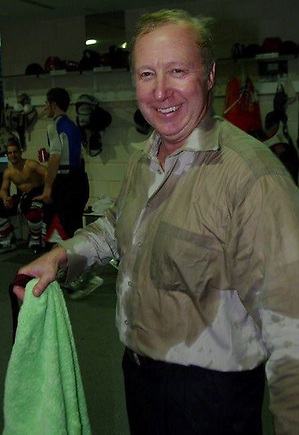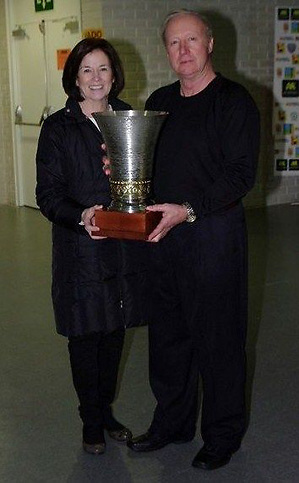Editor’s note: This is the first of an occasional series of stories checking in with college hockey personalities, past and present.
When Wayne State’s men’s team folded after the 2007-08 season, many figured coach Bill Wilkinson would retire rather than try to catch on with another school as a 60-something-year-old coach.
The word “retirement” never crossed Wilkinson’s mind, however. He helped out a bit with the Farmington Flyers high school team in suburban Detroit during the 2008-09 season, but kept both eyes and ears open for a future job.

Through his hockey contacts, Wilkinson heard about a job with a professional team in — get ready for it — Spain. He’s now the head coach for Club Hielo Jaca, a team in a five-team league. Jaca has won the Spanish championship the past two seasons and Wilkinson is back this year aiming for a three-peat.
“The first championship was very special, not knowing what to expect, but seeing the joy on the player’s faces was very gratifying since the Jaca Club had not won the championship in five years,” Wilkinson said. “Last year’s win was the most satisfying since we only lost one regular season game. The team just knew it was going to win, so it was not a big surprise. That said, every championship is special and Jaca certainly knows how to enjoy their victories.”
Wilkinson recently talked with USCHO about how he got the gig, why he took it, what his wife thinks and memories of coaching Western Michigan and Wayne State.
USCHO: How did the whole opportunity come up to coach in Spain?
BW: I spoke with Gordie Clarke, a New York Rangers scout and former player at New Hampshire, at the NCAA West Regionals in March [2009] in Grand Rapids and told him that I was interested in going to Europe to coach. Gordie had communications with David Conte, director of player personnel for the New Jersey Devils and a former player at Colgate. Dave played against me in college and then played in Jaca after he graduated. The people from Jaca had contacted Dave about getting a player for them and then they said they needed a coach. The ball got rolling from there. I knew Dave and he recommended me highly, which gave me a lot of credibility. It took about four months to finally get a contract in writing in English.
USCHO: You had said when Wayne State’s program folded that you still had more coaching in you. No opportunities to your liking in North America?
BW: I wanted to experience something new. I am sure if the right college program was available I would have looked into it. I didn’t want to start things over again like at Wayne State. That was a great experience for me, but I needed a different adventure.
USCHO: What are the differences from a coaching perspective on going from years of the college game to now coaching men, and Spanish men at that?
BW: I don’t see a lot of difference. The guys on the team have been very coachable and love to try new drills and systems. I have had several players who speak English — two boys from Montreal, a kid from the Netherlands and one from the Czech Republic. Several of the Spanish players understand English enough to get by.
USCHO: Culture shock in Spain? What have you seen so far?
BW: The main difference is the time of day people go out to eat. Dining really doesn’t start until at least 9 p.m., and then most places cater to people who eat much later. Plus all the shops close down around 1:30 to 4:30 p.m., so you have shop their time. There are tons of little fruit and meat shops on every street corner.
USCHO: Did it take a lot of prodding to get your wife, Mary, to up and move to Spain? What was her initial reaction when you gave her the news?

BW: Mary couldn’t pack her bags fast enough. I got over here on the 14th of August [2009] and Mary cleaned up the details at home before she came over on the 22nd of September. I am not sure how long I will continue to coach, but Mary has been very supportive and loves the adventure and travel.
Mary Wilkinson: Over the past two years, we have been so fortunate to have this hockey adventure in Spain. It has been an incredible experience to live in another country and be part of their culture. The Spanish are a warm, accepting and patient people, and we love it there.
USCHO: How do you get around the language barrier? Learning Spanish on the fly?
BW: Mary and I took classes a couple times a week, but I made a little progress by osmosis. You just have to been persistent in your approach, but most people are very friendly and will help.
USCHO: What have your teams been team like? What’s the structure of the league, i.e., level, competitiveness, etc.?
BW: Our teams have been very good for the Spanish league. We won a lot of our games by large margins. The team would be comparable to lower-level Division I [college], but we only had four defensemen and eight or nine forwards. When you only play one game a week, you can play limited players.
USCHO: You have also coached the past two springs with the Spanish national team in international tournaments. What have those experiences been like?
BW: My first year with the Spanish national team, we won the gold medal in Mexico City in Group A Division 2, which jumped the national team up to Division 1 for the first time in Spanish hockey. This past spring in Budapest, we won only one game in that tournament, but played very well even though it was above our ability. We played Italy, Netherlands, Korea, and Hungary. Japan was supposed to be there, but couldn’t because of all their strife and country’s national disaster problems. I was the assistant coach for both teams.
USCHO: Looking back on Western and Wayne State, what memories stand out more than others?
BW: For Western, winning the CCHA championship at Joe Louis Arena in 1985, beating MSU, 8-1, at Munn, or the 10-0 playoff win at Lawson against Michigan. For WSU, our win at Wisconsin, 5-4, with Dave Guerrera making 50 saves, beating MSU in OT at Munn or winning the CHA three straight years and advancing to the NCAA regionals at Yost and having the Michigan fans cheer for the Warriors.


